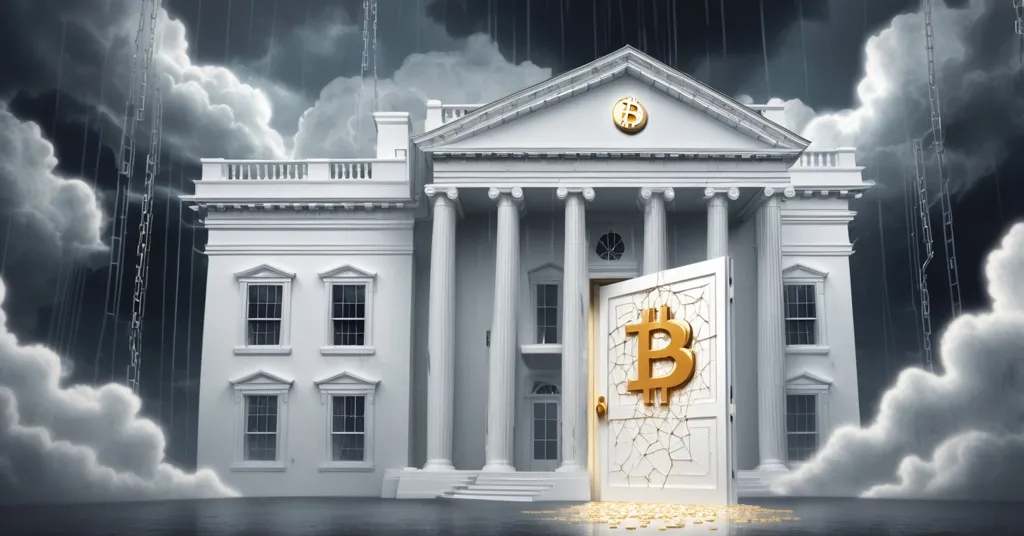White House Crypto Report Lacks Bitcoin Reserve Details Amid Industry Turmoil

White House Digital Assets Report Disappoints on Bitcoin Reserve Details as Crypto Industry Navigates Chaos
The White House has rolled out a sprawling 166-page report on digital assets, hyping a transformative vision for cryptocurrency under President Trump’s watch, but it’s a letdown on the much-touted Strategic Bitcoin Reserve. Released on July 30 by the President’s Working Group on Digital Assets, the document sketches a broad policy framework while leaving the crypto community scratching their heads over the lack of concrete plans for a U.S. crypto treasury.
- Bitcoin Reserve Void: No specifics on implementation or holdings for the Strategic Bitcoin Reserve.
- Policy Roadmap: Touches on stablecoins, SEC/CFTC oversight, and a hard no to CBDCs.
- Industry Storms: Coin mixer crackdowns, political clashes with Coinbase, and Kraken’s bullish ascent.
Bitcoin Reserve: Hype Without Substance
Following Trump’s January executive order to regulate digital assets, the President’s Working Group was tasked with outlining a framework for the Strategic Bitcoin Reserve and U.S. Digital Asset Stockpile. The idea is a game-changer: the Treasury Department amassing Bitcoin and other cryptocurrencies, primarily through forfeited assets seized in criminal busts, alongside acquisitions that don’t burden taxpayers—think of it as budget-neutral stockpiling. For Bitcoin maximalists and decentralization diehards, this could be the ultimate validation of BTC as “digital gold,” a defiant jab at fiat currency’s stranglehold. But the report delivers nothing—no timeline, no numbers on current holdings, not even a whisper on how it’ll work. Bo Hines, deputy chair of the Working Group, offered a measly crumb, stating,
“We do believe in accumulation, obviously in budget-neutral ways.”
That’s nice, Bo, but where’s the beef? David Sacks, the group’s chair, was supposed to drop details, yet we’re met with silence. A White House official boasted to The Hill,
“The [crypto] industry will be extremely pleased with us.”
Sorry, but we’re not buying it. Pleased with vague promises? Hard pass. Could this delay stem from political pushback, Treasury reluctance, or internal squabbles over legal hurdles like asset seizure laws? While we can only speculate, one thing’s clear: without a roadmap, this feels like a missed chance to cement Bitcoin’s role in disrupting global finance. For more on the lack of depth, check out this critique on the White House report’s failure to deliver.
Stablecoin and Market Rules: Progress or Posturing?
The report isn’t all smoke and mirrors. It tackles stablecoin regulation fresh off Trump signing the GENIUS Act into law earlier this month. For those new to the game, stablecoins are cryptocurrencies pegged to stable assets like the U.S. dollar—think Tether (USDT) or USD Coin (USDC)—aimed at dodging the wild price swings of Bitcoin. The GENIUS Act sets federal rules for these tokens, ensuring consumer protections and taming the regulatory chaos that once defined the space. The report nudges agencies to move fast on their duties under the Act and champion U.S. leadership in cross-border payment tech. Yet, it barely addresses the flood of foreign stablecoin issuers rushing to set up shop stateside, a gap that could let global competitors sneak ahead. Curious about the broader effects? Explore what stablecoin regulation might mean for the industry.
On broader market structure, the report backs the House’s newly passed CLARITY Act, which aims to sort out who regulates what in crypto. The plan? Hand the Commodity Futures Trading Commission (CFTC) oversight of spot markets for non-security digital assets—most cryptocurrencies that aren’t classified as investment contracts under the Securities and Exchange Commission (SEC). Meanwhile, the SEC is urged to greenlight digital asset trading at the federal level pronto, offer innovation exemptions, and support setups where exchanges can bundle custody services. This could shake up legacy finance by tearing down old barriers, a win for decentralization. But let’s not get carried away—pretty words on paper don’t mean squat without execution. Past policies like Operation Choke Point 2.0 under Biden, which saw crypto firms ghosted by banks, still haunt the industry. The report calls out these debanking shenanigans and demands transparency for crypto businesses chasing national bank charters or Federal Reserve master accounts. Will it stick? Only time will tell, but history isn’t exactly inspiring confidence.
CBDCs: A Decentralization Dealbreaker
Then there’s the White House’s outright war on central bank digital currencies (CBDCs). These are government-issued digital currencies, like China’s digital yuan, often tied to tight surveillance and control—basically, the opposite of Bitcoin’s pseudonymous freedom. The report doesn’t just say no to CBDCs; it floats slapping massive tariffs on countries that roll them out. That’s a bold middle finger to centralized money, and we’re here for it as champions of privacy and disruption. But let’s flip the script for a second: could the U.S. risk falling behind if other nations use CBDCs to speed up transactions or cut costs in global trade? It’s a gamble the report doesn’t grapple with, a curious blind spot in a document dripping with ideological fervor. Slapping tariffs as a deterrent? That’s one hell of a way to scream “no thanks” to Big Brother bucks, but it might leave us playing catch-up in the digital finance race. For community reactions, take a look at this Reddit discussion on the White House report.
Privacy Under Fire: Coin Mixer Crackdowns
On the grittier side of crypto, the report dives into the legal mess around coin mixing services—tools like Tornado Cash and Samourai Wallet that mask transaction origins for enhanced privacy. These are a lifeline for Bitcoin users shielding themselves from prying eyes, whether it’s activists dodging oppressive regimes or everyday folks avoiding data grabs. But they’re also a magnet for illicit activity, often linked to money laundering. Tornado Cash co-founder Roman Storm is staring down a potential 45-year sentence as his trial for money laundering and sanctions violations hits jury deliberation. Samourai Wallet’s founders, Keonne Rodriguez and William Lonergan Hill, already pled guilty to money transmitting charges, coughing up a jaw-dropping $237 million forfeiture and awaiting sentencing on November 7. The Department of Justice (DOJ) and Financial Crimes Enforcement Network (FinCEN) aren’t playing, and the report pushes for updated guidance to curb illicit finance. North Korea’s alleged use of Tornado Cash for hacking proceeds only fuels the crackdown narrative. Yet, here’s the kicker: where’s the balance between privacy rights and crime prevention? These cases could chill innovation in decentralized finance (DeFi), setting precedents that scare off developers. For a space built on freedom, that’s a gut punch we can’t ignore. Dive deeper into the impact of coin mixer crackdowns on privacy and recent updates on Tornado Cash and Samourai Wallet legal outcomes.
Industry Power Plays: Coinbase, Kraken, and Political Mud
Political drama in crypto is getting uglier than a rug pull on a no-name altcoin. Coinbase, a heavyweight U.S. exchange, and venture capital titan Andreessen Horowitz (a16z) are catching heat from the White House over their push to bundle stablecoin and market structure bills. The administration wanted separate legislation, and a senior official didn’t hold back, reportedly snapping,
“You’re just fuckin’ wrong.”
A Republican operative piled on, griping,
“At the end of the day [Coinbase] wasted two weeks of the legislative calendar by slowing everything down.”
Even with their Fairshake PAC shelling out $135 million in 2024 and banking $140 million for the 2026 midterms, they’re accused of overplaying their hand. Another official warned against cozying up to Democrats, barking,
“If [Democrats] take power again, you’re not getting shit.”
This hostility stings. We’re all for shaking up the system, but when crypto giants turn into political pawns, does it advance adoption or just drag us into old-world power games?
Elsewhere, the Winklevoss brothers of Gemini exchange fame allegedly nudged Trump to stall Brian Quintenz’s CFTC chairman nomination over budget hikes and agenda misalignment. The White House claims Quintenz is still in the running, but this backroom nonsense reeks of the politics crypto is meant to upend. And let’s not forget Gemini’s own regulatory baggage—irony much?
On a sunnier note, Kraken is killing it, raising $500 million at a $15 billion valuation with eyes on a 2026 IPO. Their Q2 gross revenue hit $412 million, up 18% year-over-year, with trading volume at $187 billion (up nearly 20%) and 4.4 million funded accounts (up 37%). Co-CEO Arjun Sethi teased,
“When we think it’s the right time for us to go, we’ll go.”
Cocky, but earned—they’ve dodged an SEC lawsuit, acquired NinjaTrader for futures trading, and nabbed a MiCA license for EU operations. Compared to Coinbase’s $41 billion valuation or Binance.US’s legal woes, Kraken’s riding high. But let’s not sip the Kool-Aid just yet. Sky-high valuations can tank faster than a leveraged shitcoin if markets sour or regulators flip. This mirrors a wider trend—Circle’s $1 billion listing and eToro’s Nasdaq debut signal market confidence tied to wins like the GENIUS and CLARITY Acts. Still, volatility lurks. For more on Kraken’s growth, see this analysis of their fundraising and IPO plans.
Trump’s Crypto Conflicts: Policy or Profit?
Here’s a bombshell worth dissecting: Trump’s personal crypto stakes. Federal disclosures show he and his family are neck-deep in ventures like a Bitcoin mining firm, a meme coin, and a stablecoin through World Liberty Financial, raking in $57.3 million. Trump Media reportedly holds $2 billion in Bitcoin. That’s not pocket change—it’s a glaring conflict of interest. Democrats and ethics watchdogs are already circling, with Tony Carrk of Accountable.US slamming the report as a “self-aggrandizing industry wishlist” and accusing Trump of wielding presidential power for personal gain. On the other hand, CoinShares’ James Butterfill calls the report “highly ambitious and ideologically clear,” though he warns success depends on bipartisan action and balancing freedom with integrity. We’re rooting for a pro-crypto White House, but when policy and profit blur, even Bitcoin bulls have to squint. Could World Liberty Financial’s stablecoin ambitions or a dodgy meme coin sway regulatory priorities? It’s a question that demands scrutiny, not blind cheerleading.
Global Stakes: Where Does the U.S. Stand?
Zooming out, the U.S. stance on digital assets has ripple effects. Opposing CBDCs while nations like China push digital yuan adoption could impact dollar dominance or cross-border trade efficiency. A Bitcoin Reserve, if ever fleshed out, might signal to the world that the U.S. sees crypto as a strategic asset, potentially spurring global adoption—or backlash from fiat hardliners. The report’s silence on international competition feels like a dropped ball. As we champion decentralization, we must ask: does this inward focus strengthen or isolate us in the race for digital finance supremacy? It’s a tightrope, and Bitcoin’s future as a disruptor hangs in the balance. For official insights, refer to the U.S. policy details on the Strategic Bitcoin Reserve and the broader framework in the White House’s July 2025 report on digital assets.
Key Takeaways and Questions for Crypto Enthusiasts
- What’s the status of the Strategic Bitcoin Reserve?
The White House report offers zero details on plans, holdings, or timelines, despite talk of budget-neutral accumulation using seized assets. Infrastructure is vaguely “underway,” leaving us in limbo. - How does the report tackle stablecoin regulation?
Post-GENIUS Act, it pushes agencies to act quickly and boost U.S. leadership in payment tech, but ignores the influx of foreign issuers looking to onshore. - What regulatory changes are eyed for SEC and CFTC?
The report proposes CFTC control over non-security spot markets, SEC innovation exemptions, and federal trading enablement—steps to clarify crypto’s legal playing field. - What’s the impact of coin mixer legal battles?
Tornado Cash’s Roman Storm risks 45 years as his trial wraps, while Samourai Wallet founders pled guilty with a $237 million forfeiture, signaling a harsh crackdown on privacy tools. - Why the tension with Coinbase and Andreessen Horowitz?
Their insistence on combined legislation clashed with White House strategy, drawing flak for delaying progress despite massive Fairshake PAC funding. - What fuels Kraken’s momentum?
A $500 million raise at $15 billion valuation, $412 million Q2 revenue, and regulatory wins position Kraken as a leader eyeing a 2026 IPO, though market risks loom. - Should Trump’s crypto ties raise red flags?
His $57.3 million earnings and family ventures spark conflict-of-interest fears, potentially tainting the report’s motives despite its pro-crypto tilt. - How do privacy crackdowns affect DeFi innovation?
Legal precedents from Tornado Cash and Samourai Wallet could deter developers, stifling DeFi and privacy tools crucial to Bitcoin’s ethos of freedom.
The White House report dangles a vision of a crypto-friendly future with Bitcoin at the forefront, but it’s thin on actionable steps. Legal assaults on privacy tools, political infighting, and ethical gray areas around personal profit muddy the path forward, even as players like Kraken charge ahead with optimism. We stand for decentralization and disruption, but let’s not kid ourselves—Bitcoin’s road to mainstream adoption is a gauntlet of promise and peril. Stay sharp, because this revolution won’t wait for stragglers.



